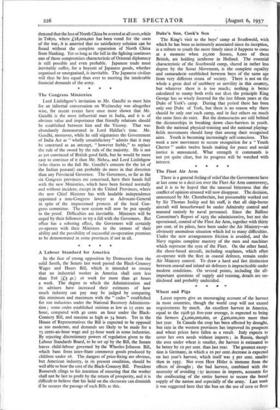The Congress Ministries Lord Linlithgow's invitation to Mr. Gandhi to
meet him for an informal conversation on Wednesday was altogether wise, for recent events have once more shown that Mr. Gandhi is the most influential man in India, and it is of obvious value and importance that friendly relations should be established between him and the Viceroy. That was abundantly demonstrated in Lord Halifax's time. Mr. Gandhi, moreover, while he still stigmatises the Government of India Act as " wholly unsatisfactory " admits that it may be construed as an attempt, " however feeble," to replace the rule of the sword by the rule of the majority. He is not as yet convinced of British good faith, but he would be more easy to convince of it than Mr. Nehru, and Lord Linlithgow (who shares to the full Mr. Gandhi's concern for the lot of the Indian peasant) can probably do more in that direction than any Provincial Governor. The Governors, so far as the six Congress provinces are concerned, have their hands full with the new Ministries, which have been formed normally and without incident, except in the United Provinces, where the new Chief Minister has with laudable independence appointed a non-Congress lawyer as Advocate-General in spite of the impassioned protests of the local Con- gress committee. The new system will now be put openly to the- proof. Difficulties are inevitable. Ministers will be urged by their followers to try a fall with the Governors. But office has a sobering effect, the Governors will certainly co-operate with their Ministers to the utmost of their ability and the possibility of successful co-operation promises to be demonstrated in some provinces if not in all.






































 Previous page
Previous page